You know that you have a Mary Sue when she upsets the monochromatic color scheme of my Writer's Guides.
Mouse over blue text to see a note.Internet communities often lash out at writers who create
Mary Sues. Declaring the writing to be below their standards, they proceed to punish the creators. They mock the characters, verbally abuse the writers, and write hyperbolically about how much they wish the characters would die.
Bullying writers (who may be very young) is only going to make them afraid to write—
and therefore improve—or share their work. Not only that, but it discourages other writers from speaking for fear of public mockery, and it may silence the voices that could someday become great.
If you've directly or indirectly suffered from the abuse of such individuals, let me first apologize on their behalf. I don't care if your story stinks so much that it can be smelled from fifty miles away; mocking you for it is
cyberbullying. If you find people who try to
hurt your self-esteem instead of
offering constructive ideas, then I suggest you block them and forget about them. Unhelpful criticism is not worth your time.
Now let's take a moment to forget about cruel communities and whatever they think about your story—who cares about bullies' opinions, anyway?—and focus on what you think about it.

EEEEEE I think I have a Mary Sue!!!!!!
First of all, remain calm. Approaching your story in a frenzy is hardly the right thing to do, especially if you're going to reevaluate your characters and their position in your book. If you're feeling panicked, repeat these five things and take deep breaths.
1. The term
Mary Sue is
subjective.
2. People who tell you that your story stinks are jerks. No, I don't care if they were "trying to be helpful." They're still jerks.
3. Having an item or two on a list does not make your character a Mary Sue.
(And if it did, I would be in major trouble, and so would Mark Twain, F. Scott Fitzgerald, my best friends, probably every other writer on the planet, and God)4. Characters can be modified.
5. Having a Mary Sue is not the end of the world.
So don't worry; you have all the time in the world to mess with your character.*
*unless you have a deadline. Then you have some of the time in the world.If you're uncertain about what a Mary Sue is, see
this piece for elaboration.
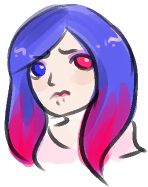
Is My OC a Mary Sue?
Your character has pink hair? Well, I guess she's a Mary Sue. But don't worry, that also makes my brutish, duty-driven, amoral villain Bruk a Mary Sue. You see, he was genetically engineered by an alien who
didn't really know what he was doing. Bruk hates his hair. I gave it to him because (a) I wanted to make a commentary on the cultural expectation of masculinity and the resulting social pressures, (b) my audience would enjoy it, and (c) I thought if was funny. (Or maybe I just thought it was funny. I don't really remember.)
I'm not going to give you a list of unacceptable hair colors or limits on numbers of talents a character may possess. My guess is that you've already heard plenty about that. Besides, do you
really think my Bruk is a Mary Sue? (Hint: He's low on the suspect list.)
Things such as hair color and singing voice can certainly call attention when they start to pile on, but they are only symptoms of underlying behaviors that truly define a Mary Sue. Let's take a deeper look at these.
- Do all the interesting things in my story happen to this one character, or is (s)he guaranteed to be involved in anything significant to the plot?
- Do I give my character traits or a history to try to make him/her "special" or draw attention to him/her?
- Is my character flawless or a perfect example?
- Do I consider my character superior?
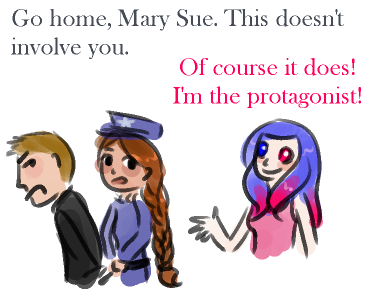
My character is involved in every interesting event.
If your character is the main character, it's natural for them to be present when important things are happening. The story is focused on your character, after all!
However, sometimes things can grow a little out of hand. Your character becomes present all the time (even when their presence isn't needed), and your character's business is the only business that matters. When the female supporting character gets a secret love letter from her crush, she spends a few lines wondering about it before the main character's issues become the main topic of conversation. Your character's mentors have no lives outside of helping your character. Your character shows up at council meetings discussing the fate of the universe, even if she is a fifteen-year-old girl whose only credentials are her interest and her stellar grades at school, and
they don't escort her out of the building as soon as they see her or call her parents if she tries again. Do any of these situations sound vaguely familiar?
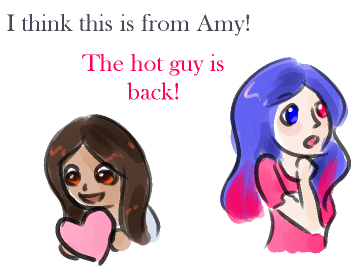
Take a moment to consider whether the plot serves your plans or your character. In fact, a moment might be too short. I'd recommend a week of rereading your story, scene by scene, and asking yourself these two key questions:
- Does other characters' business get much screen time, or does your character and their business constantly steal the show?
- Do important things constantly become your character's business (and no one thinks this is strange)?
Let me use a Venn diagram to elaborate.
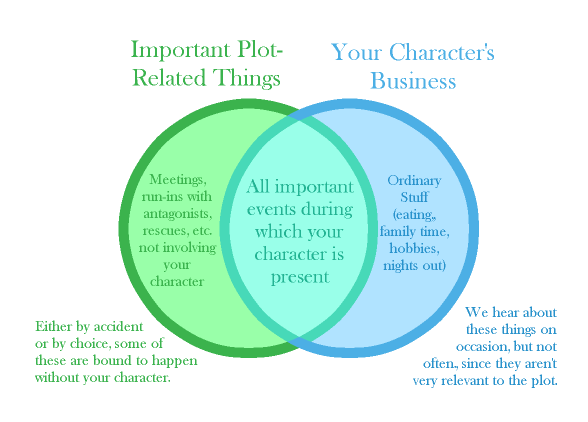
If your character is one of the main characters, there's naturally going to be a lot of overlap between the "important things" and "things involving my character" categories. This will especially be true if your character is the narrator.
The danger is focusing solely on your character's business—to the point at which anything not directly involving your character is dismissed. When you push other characters' affairs to the side (for example, spending no time developing the relationship between the characters' two best friends), you end up with a flat storyline and cast. Each significant relationship is between your character and someone else, and any sense of community is lost. If the other characters no longer had your character to lean on, they would probably drift around aimlessly and the plot would fall apart.
Because anything not involving your character is dismissed, your character
needs to be present at any event of significance, even if it wouldn't make sense. These events can sound contrived, like the author pulled as many ropes as possible to make sure that the favored character would be there. Readers will pick up on that.
The bottom line: if you're focusing too much on your character, relax! Keep in mind that your readers will want to like your supporting characters too. They might be excited to guess who sent Neva the love note and watch her try to gather the courage to talk to her crush. Find the qualities that you love and identify with in other characters, and try spending time developing those too. And don't worry—even if we have to follow your character's mentor or their cousin to the Bicentennial Mystic Gathering of Awesomeness, we'll still be paying attention when the huge fire demon appears.
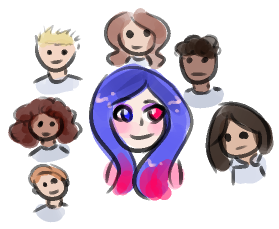
My character is extra unusual.
I'll close my eyes, take a moment to read your mind, and say that there is a very strong chance that your character is unusual. Why? Well, unusual characters are more likely to do things worth telling in a story. (And if you consider your character to be completely normal, you probably don't feel the need to read this, do you?)
Many stories follow unusual characters—often the character has something special about them that helps solve the problem of the story. That's common, especially in fantasy stories. However, if you make your character
so unusual that everyone has to notice, they might be a victim of Princess Rose Syndrome.
Princess Rose Syndrome is a name I invented for a common Mary Sue trait. It's named after
my little sister's character (a toy used when I babysit her). Princess Rose has many quirks: she sleepwalks, she occasionally forgets to brush her hair, she gets a lot of random nightmares, she heroically leaps into fights that she always loses, and before she was married, her boyfriends would constantly break up with her for no real reason.
But wait. Princess Rose is a Mary Sue? These traits seem completely random! Forgetting to brush her hair?
That's not on any litmus tests. Is there some other secret list that was never available online?
The truth is that any trait can be considered a Mary Sue trait... if it's being used as a device to draw attention to the character. Princess Rose forgets to brush her hair because Katie wants another character to come brush it for her. When she has yet another bad dream and whisper-shouts "Mom! Dad!" or "Maddy! Maddy!", she wants someone to come running to comfort her and listen to her retell her dream four or five times. And when she battles the bandit to try (and always fail) to save Teddy Bear, someone must rescue her.
Most of Princess Rose's personality traits are designed to call attention to her (instead of to characterize her or move the plot). Princess Rose is something of an avatar to Katie: when Princess Rose's husband George rescues her from the river, kisses her hair, and picks out pretty clothes for her to wear, Katie feels that the attention is somehow transferred to her. Then Katie has all sorts of bad things happen to Princess Rose so that someone will come running to rescue and comfort her.
A lot of beginning writers will set up their special characters to gain attention without needing to ask for it. (That way, there's less risk of them seeming spoiled and egocentric.) When supporting characters constantly run to alleviate some pain or aid in some crisis related to the main character, the whole plot begins to twist into a black hole where everyone is drawn to the main character. This is what people usually dislike most about a Mary Sue.
I've received a lot of questions regarding certain stereotypical traits (especially unusual appearances) and if they're okay to use. There is no definite yes or no—pretty much any trait can appear in a well-written character. The main danger of these "
litmus test favorites" is that they tend to attract attention to your character without adding anything useful to the story. Teen and adult readers can usually recognize this. This may make them wary of your character, since they know that super-special traits and author favoritism often go hand in hand. They may not be as willing to suspend their disbelief.
Here are some things that are
often misused to pull attention to a character instead of to further the story's realism, plot, or theme:
- Eye-catching/unusual appearance
- Clumsiness
- Trauma/angst/trivialized mental illness (resulting in comfort and worrying)
- Revealing/sexy clothing (even if the character is supposedly shy)
- Strange, gossip-inducing behavior
- Cluelessness (that attracts a self-appointed mentor)
- Charisma (resulting in special treatment; it may be informed)
- Attractiveness
- Shyness/introversion, causing other characters to constantly push the character to interact and "have fun" more.
- Hidden talents (someone discovers your character is a piano virtuoso)

Do these sound familiar? They probably do—you see them all the time in litmus tests. Litmus tests try to detect trends in Mary Sues and gather them into a list.
The flaw of litmus tests is that they tend to focus on superficial aspects instead of the author's underlying motives. If a character cries all the time, it could be because the author likes to have other characters run to her and comfort her, or because the author wants to create a realistic depiction of the impact that mental illness can cause on a person's health and relationships. A litmus test won't differentiate. Only you, the writer, can understand your own motivations.
Characters with Princess Rose Syndrome represent a naive outlook on life: the idea that in order to get attention, you will need things to happen to you, and then everyone's ears will perk up and they'll focus on you. As Katie is slowly learning through Princess Rose, you don't need to have a bandit push you into a raging river for other people to notice you. If you're lonely, all you need to do is find someone who loves you, give them a hug, and ask if you can keep them company for a while.
And if you feel so lonely that you constantly need to live out fantasies of love and attention through your stories, then please, reach out to someone. Because you deserve to be close to good people in real life.
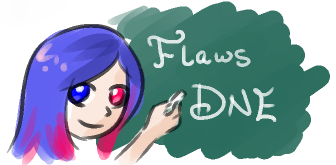
My character is flawless.
I'm sorry, but you can't get out of this one: If you consider your character to be perfect (or practically perfect), critics will label them a Mary Sue and a product of immature writing. Why? Well... come sit down on my fuzzy blue rug and I'll read you a story.
Of all the martial arts masters in America, Jodie was the finest. Quick and powerful, her skill was exceeded only by her kindness and intelligence. Nothing scared her, and she was known for beating ninja armies while other martial arts masters cowered in awe. Being a computer genius and a generous person, she angelically donated most of her income to starving orphans and bought a mansion with her spare change. She also babysat the mayor's precocious four-year-old daughter, who adored her and wanted to be Jodie when she grew up.
One day, Jodie heard that the child was kidnapped. (Please pause for a minute and predict how this story will end. Can Jodie save the girl?) She used her amazing computer skills to find the evil kidnappers. Then she soundlessly stalked to the kidnappers' hiding place, kicked their butts in 10 seconds flat, and returned the girl to her parents, who wept with joy at Jodie's kindness and awesomeness.
Remember when I asked you to predict the ending of the story?
Did you doubt for a second that Jodie would fail?I was getting pretty bored by the time she rescued the girl. It was clear that someone as awesome as Jodie couldn't possibly lose, so my eyes kind of glazed over near the end. I would have put the book down and made myself a turkey sandwich, but I had to finish writing it as an example.
If your character is the epitome of perfection, then the battle is already won. So who cares? Lunch (and all the chocolate you can have for dessert afterwards) is much more interesting. Why waste your time reading when the ending is obvious?
Now I'm going to tell another story. This time, I'll cast some doubt on Jodie's abilities. I could give her all sorts of flaws: wimpiness, recklessness, plain stupidity... For the sake of brevity, I'll only discuss one flaw.
As a child, Jodie was exploring a cave system with her parents when bats swooped down around her. Terrified, Jodie ran into the woods and was lost for hours until a search team found her. Now, whenever Jodie is in the dark, she has a gnawing feeling that bats will fly at her at any time, sometimes making her panic.
This leads to several embarrassing incidents during the course of the story, and the other martial arts masters laugh at her for being so terrified. She gets mad at herself and thinks she's weak and stupid, yet whenever she is in the dark, she still can hear the sound of bat wings rushing above her. Her only consolation is in her martial arts practice and in babysitting the mayor's vivacious little daughter. When Jodie overhears that the girl is being held in a cave system but will be moved to a more secure location in an hour, she is terrified to go in, but she forces herself to enter.
Bats swoop above her, and fifty yards in, Jodie freezes in fear. Fighting her growing terror, she takes a deep breath and continues shakily forwards. Finally, she hears the kidnappers talking and sees them in the cave with the little girl. Thanks to many years of martial arts training, she kicks the kidnappers' butts. Jodie picks up the child and runs out of the cave, disturbing a bunch of bats. They fly right above her head. The little girl begins to cry, and as Jodie whispers soothingly about how the bats don't want to hurt her, she realizes that she has nothing to fear.
If that was a real short story, would you read it? Would you recommend it to a friend?
If you keep the reader wondering if your character can meet the challenge, then your reader is much more likely to stay glued to the book. Is Jodie
capable of rescuing the sweet little girl? What if she dies? What if Jodie is too scared or weak to save her? Suddenly it's 3 pm and your reader, unable to put off eating any longer, brings the book to the table and distractedly makes a turkey sandwich, all while reading nonstop to see if Jodie can beat the bad guys.
When Jodie's weaknesses make a task challenging for her, her victory is all the more monumental. This was no everyday accomplishment for her; she faced a situation that was
downright terrifying for her and she won the battle!
Furthermore, Jodie's imperfections make it easier for readers to relate to her. Most of your readers probably aren't afraid of the dark or of bats, but they all have their flaws that they are struggling to overcome. Maybe one of them is scared of the thunderstorms. Or a bully. I personally am terrified of that feeling when you look in the cabinet and see there is no chocolate left.
They can relate to Jodie's fear and struggle for self-improvement, because they face these things in their own lives. When Jodie succeeds, they can vicariously enjoy that success and pump their fists in the air. It may even inspire them to challenge themselves the way she challenged herself. For example, Jodie's tale could give me the strength I need to take ten bucks, steal my dad's car, drive to the grocery store, and buy some more chocolate! (Okay, bad example. Imagine a timid reader remembering how Jodie overcame her fears and telling that bully that his racist comments are unwanted and rude.)
Perfect characters are boring, because they never need to struggle to get what they want. So give us some suspense! Let us wonder if your characters are up to the challenge! I promise we can take it. We just might forget to put the turkey in our sandwiches.
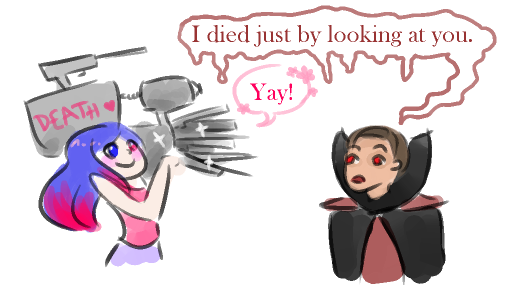
My character is superior.
I imagine that there will be some confusion here, so let me define what I mean by
superior. We'll call your character "superior" if:
1. Given their age, education, or other limiting factors, the character is mind-blowingly talented. (A twelve-year-old girl can easily do magical spells that are too complex for most experienced adults.)
2. Your character's combined talents are much more than other characters' talents. (She can pilot a ship through the tightest squeezes, repair all sorts of broken machinery without opening a manual, beat up five men at once, and cook delicious food. One friend is more skilled with machines, but she has no other talents. Another friend is a great chef with some medical knowledge, but these are his only strengths.)
3.
Nobody can do what your character does. (Your character is the best cello player in the whole world.)
Case 1:
I want you to stop and think for a moment. Talented people exist, and it's not a sin to make your character talented. But let's run through some numbers for a moment.
Could 10% of the people with the same limitation (age, education, whatever) do this? If so, your character is skilled and hopefully their parents or mentors coaxed them to develop these skills if your character was interested in them. I bet they were very proud.
Could 5% of those people do so? If so, your character is something. If the skill was intellectual, your character was probably the smartest person in their grade as a small child, and they probably didn't have to work very hard in school until they sorted out the "advanced" students into harder classes.
Now, could only 1% of those people do what your character does? If so, then your character is most likely some sort of genius. Geniuses do show up in real life—I heard of a twelve-year-old kid at my old high school who will be learning calculus next year—and while they often struggle to know what other people can and can't do, they can still operate within the real world. They can also often earn high salaries in their fields.
However, if only .00001% of the people with the same limitations can do what your character can do, you'd need to have one heck of an excuse for it. Many readers will have a hard time believing that a character like yours can do the things they do, which creates unnecessary tension in their minds. Here are your options.
1. Ignore me and blitz off into the sunset with your expert thirteen-year-old computer programmer.
2. Change your character's limitations. Suddenly your thirteen-year-old becomes an eighteen-year-old. People might still raise their eyebrows when he says that he can dismantle the foreigners' complex computerized bomb, but the reader will bet on him. A genius eighteen-year-old, after all, could probably do that, and nobody will think he secretly had his mom do it for him.
3. Change the limitations in a fantasy or sci-fi scenario. Maybe all preteen children in your universe are writing their own semi-sophisticated computer programs, while your character is smart enough to write very complex ones.
4. Make your character less skilled. Could an intelligent, dedicated thirteen-year-old boy create a computer program? Probably, especially if he had plenty of websites for reference. And believe me, his parents will still be
very proud.
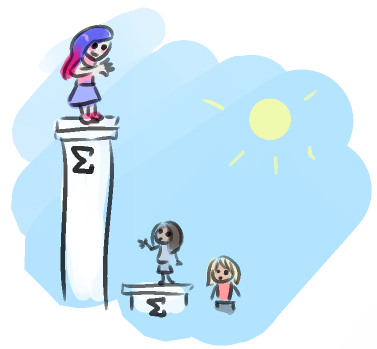
Case 2:
It seems you have a jack-of-all-trades: a character who has many talents. That's not too surprising. In fact, I have many skills too! Let me share them with you.
My interests: writing, drawing, playing piano, playing flute, speaking Spanish, playing recorder, acing tests, singing, babysitting, getting my teachers to like me
In fact, I'm even at a special advantage: watching TV and going to parties are not included. While my peers were watching
Hannah Montana, I was drafting my first novel. When other teens went out to party, I stayed at home painting a pink light over Kirrah's face. Essentially, I had no social life.
So all this practice time must make me an incredibly amazing person, right? I should be just like that pilot/warrior/mechanic/chef.
Actually, the piano thing is just a hobby. I've been practicing less to make time for writing, drawing, and acing tests. I can't even play much Debussy yet. I'm a decent flutist, but I'm only in the top 75% at my school, and I've touched my recorder about 10 times in the past five years. I can get my teachers to like me, and my misanthropic art teacher sorta-semi liked me on her good days, but my English teacher still gave me Bs on half my essays.
As I've hopefully been able to illustrate, it's quite possible to have a lot of "talents," especially if your character loves to try new things. However, as your character gets older and more skilled, they will have to choose between skills and ultimately excel in one or two. (I practice writing and drawing the most. Things like piano are hobbies. Things like brown-nosing are life skills.)
Furthermore, your character's sum total of skills is probably not going to be overwhelmingly greater than other characters'. Why not? Take me for example again: I can write better fiction than my friend writes. However, when we discuss the media, she can give much more powerful and convincing arguments on the media's portrayal of women, while I say "What is this 'Steven Cole-bear' of which you speak?" Her Spanish vocabulary is also larger than mine, she has more friends right now than I'll have in my entire life, and she can give detailed analyses of TV shows that I have never seen. If not for my incredibly blinding awesomeness that exceeds mortal measures, I'd have to say that our skill levels across all fields are approximately equal.
Of course, no two people are exactly equal in skill: an intelligent woman who learns quickly and excels in time management is going to be more skilled overall than a high school dropout who watches sitcoms and smokes illegal substances all day while vaguely wondering what he'll do when his unemployment insurance ends. However, if you have several motivated characters, and yet one of them is constantly more prepared in many varied situations, you have to start wondering if this is even
possible. Besides, there are only 24 hours in a day, and everyone needs downtime. While I may be blindingly awesome, I still spend time reading
webcomics and chatting with my parents.
So if you're tempted to make your character a human Swiss army knife, pause for a moment. How did your character get such an advantage? Is it
too much of an advantage? (A childhood full of rigorous practice and no playtime is likely to result in depression and burnout instead of superhuman awesomeness.) You can always hand off important skills to your character's friends, too, to spread them more evenly throughout the team. Maybe she can expertly pilot ships and kick butts, but she leaves the mechanics and cooking to her two best friends.
Besides, when the main character can't do everything, it's so much more deliciously frightening when things they hold dear are at stake. (Remember Jodie?) Then we authors are capable of so much more eeevil.
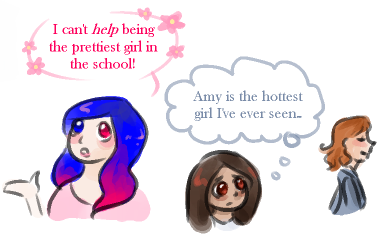
Case 3:
I hear that your character is the smartest person on planet Earth. Well, this might be difficult for you, but did you just see which character I placed on the planet? Yes, that woman there. Well, she is smarter than your character.
Oh, and that man I placed next to her? He's her husband. He's not quite as smart as she is, but believe me, he's still smarter than your character. Oh, and so is his younger sister, whom I placed over there. Now your character is the fourth-smartest person in the world.
So let me tell you about these new characters. The woman and her husband live in Taiwan right now. They study psychology and write helpful papers to improve school and business environments. In their spare time, they play ultimate chess together, which is like chess for supergeniuses. The younger sister earns mountains of money in the computer industry, and she made a little website where they could all play long-distance ultimate chess together.
Is this going to hurt your story?
Think about it. When your genius character realizes that the planet is in grave danger, the smartest person in the world is very busy working in Taiwan with her husband, while the third-smartest is playing long-distance ultimate chess. And if someone sends out emails to hire people for the Project of Unspeakable Importance, the programmer might be in the middle of a project for economic development in impoverished countries, while the smartest couple says, "Sorry, but that's outside our area of expertise." Believe me, that employer will still be overjoyed if your character can come.
Unless your story's theme strongly involves the idea of being the very very best, chances are your character doesn't need to be the best. If your character is incredibly talented, they can still solve whatever task you need them to solve. There is no project so extremely difficult that only one person in the universe can solve it, and if there is,
who the heck came up with it, anyway?So if you want to edit your book and change "the absolute best" to "the famously skilled," I promise it won't hurt the plot. And your character will still be awesome.
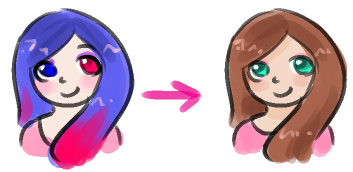
Fixes
Are you reading this with a specific character in mind? If so, I want you to pause here. Think back on what you just read. Take a minute to jot down some notes on a sheet of paper or in a .txt document.
You do not want to forget the thoughts you've had about altering your character. (I'll wait for you. I promise.)
Did you write down your thoughts? If not, GO BACK AND WRITE THEM, YOU CHEATER! Now reread what you wrote and consider it. Have you been making your character "ideal," or are you trying primarily to focus on them instead of simply telling the story? In which ways are you dissatisfied with your character?
Now ponder these questions:
- If my character is unusually skilled, how skilled does my character really need to be? Do they need to be the best, one of the best, or simply awesomely talented?
- If I have a walking, talking Swiss army knife, which skills could be given to another character or cut out altogether without destroying my plot? Could I strengthen the story by giving a crucial skill to a character's friend (or reluctant ally)?
- Am I trying to teach readers how to be perfect by holding up one character as a guiding light? Could I impart the same lesson by making the character flawed and then having them learn that lesson?
- Which strong/attention-attracting traits are essential to my character and/or the plot? How do they add to the story?
- Which strong/attention-attracting traits are not essential?
- Am I neglecting characters and their relationships in favor of focusing on my special character?
- Am I using my character as a way to feel loved?
Now, unless you answered yes to the last question, here's what I suggest doing next. (If you did answer yes, you can still do this; I just want you do do something else first.) Take however long you need to let these questions roll around in your head. Again, I'll wait while you ponder these. Go for a walk if you need to. Then come back.
Have you decided upon some preliminary revisions?
Yes?
Have you done what I said?Good.
This is your character's rebirth. You've pared away the attention-seeking and the superiority, the too-perfect curly hair and the clumsiness that was only meant to gain sympathy. Now you're left with a character who is not necessarily stronger, but
more balanced. Your character feels more realistic, making it easier for readers to love and relate to them.
Take your new character and revise your book, cutting out traits of the old character and putting in traits of the new one. I know. I probably just asked you the equivalent of climbing Mount Everest in a thunderstorm while wearing a bikini. (At least, that's how I feel when editing my own book, although my amazing gorgeousness is less obvious then.)
Editing is a difficult task, but hey, remember the way Jodie felt when she entered the dark cave to save the little girl? She was terrified. She doubted she could handle it. Every step forward seemed to take an hour, and she was left floundering in the dark, knowing that any second bats might swoop around her and
she would fail.But little girl needed her, so she gritted her teeth and pressed onward. She kept walking deeper into the darkness and refused to go home. If your goal is worth it, then you too can find the strength to look the task in the eye and say, "I'll do it!" I know you can!
And now I'd like to take a moment for those who answered yes to that last question—the ones who use their characters to feel loved. Your battle is a tough one, because it's easy to be deeply attached to your character the way they are. The fantasy of loving, attentive family members and friends is so alluring that it's difficult to discard. It may take a long time before you feel ready to make a change. Paring away your character's clumsiness or constant need of rescue will be difficult when those are such convenient ways to vicariously feel the love and support that others will give your character.
But look, imaginary love and support are poor substitutes for the real thing. And I think you already know that. You don't have to feel
guilty for fantasies—everyone has them,
including me. But if you find that they're the only way you find comfort, then please don't feel afraid to reach out. Find a kind person and share your fears or successes with them. Say "I'm lonely" or "I want to hang out." Searching for caring people is not an easy or quick process, and I know that it's much easier said than done—but you deserve an ally in real life too.
It'll take time before you can shift your story's focus away from only love and comfort, and it'll take a huge conscious effort. Let that special character be independent for one time, or skip the extra recognition. Show on how your character
gives love and attention to others too, or on how these other people relate to each other. Think about what makes your other characters special, and develop their love and relationships with each other too. In time, others' love of your character will become one aspect of a story full of caring, complex relationships. It may not be easy, but
it is achievable, and yes, you can do it.

Parting Words
Identifying, troubleshooting, contemplating, and fixing a Mary Sue requires an emotional distance and discipline that cannot be achieved over a short time. You may have to focus your thoughts entirely on other characters or even let your story sit for a few months to work on something else. Moving beyond a Mary Sue is one of the most difficult tasks a writer can do, but with time and strength, you can become a champion.
Most writers struggle with Mary Sues at some point in their lives. Some of them move beyond them after a story or two. Others spend decades working with idealized or attention-seeking characters. Thanks to the notes you wrote (you
did listen to me, didn't you?), you have an edge—i.e., an action plan.
I'm not going to keep you sitting here any longer. Go! Go write! Go edit! Mount Everest is as good as yours.

 Many thanks go to ewm, who patiently sorted out a categorizing bug with me at the help desk so this would be possible!
Many thanks go to ewm, who patiently sorted out a categorizing bug with me at the help desk so this would be possible!

























![[F2U]Progress Bar - Rainbow Star](https://images-wixmp-ed30a86b8c4ca887773594c2.wixmp.com/f/b31ff556-b57a-4135-8798-efa11ce85221/d6rw8v2-ffee5e56-9dca-445a-ac85-18fe661a7049.gif/v1/crop/w_92,h_92,x_14,y_0,scl_0.98924731182796/_f2u_progress_bar___rainbow_star_by_starriichan_d6rw8v2-92s.png?token=eyJ0eXAiOiJKV1QiLCJhbGciOiJIUzI1NiJ9.eyJzdWIiOiJ1cm46YXBwOjdlMGQxODg5ODIyNjQzNzNhNWYwZDQxNWVhMGQyNmUwIiwiaXNzIjoidXJuOmFwcDo3ZTBkMTg4OTgyMjY0MzczYTVmMGQ0MTVlYTBkMjZlMCIsIm9iaiI6W1t7ImhlaWdodCI6Ijw9OTMiLCJwYXRoIjoiXC9mXC9iMzFmZjU1Ni1iNTdhLTQxMzUtODc5OC1lZmExMWNlODUyMjFcL2Q2cnc4djItZmZlZTVlNTYtOWRjYS00NDVhLWFjODUtMThmZTY2MWE3MDQ5LmdpZiIsIndpZHRoIjoiPD0xNTAifV1dLCJhdWQiOlsidXJuOnNlcnZpY2U6aW1hZ2Uub3BlcmF0aW9ucyJdfQ.YLLSc6UAUqoL-rsHlYsjBTsp34PdURF2NoDd44LR4yI)

